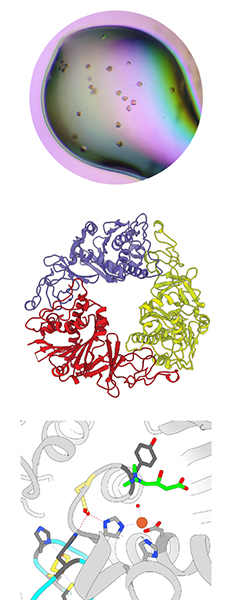Stabilizing the enzyme in fish odor syndrome
Fish odor syndrome, or trimethylaminuria, is a disease in which the liver cannot break down the smelly chemical trimethylamine, or TMA, that is produced by enzymes from bacteria residing in the gut. There is no cure for fish odor syndrome, which gives people an unpleasant fishy smell that can affect breath, sweat, urine and vaginal fluids.

Our research team at the University of Warwick is working to prevent the syndrome through studying the enzyme in the gut that produces trimethylamine.
Fish odor syndrome starts when an enzyme pathway in the gut called CntA/B produces TMA. The enzyme breaks down a TMA precursor called L-carnitine, which is found in dairy, fish and meat. If an individual lacks a functional liver enzyme called FMO3, they cannot degrade TMA into a non-smelly chemical form, trimethylamine oxide, or TMAO. The TMA then builds up in the body and ends up in bodily fluids.
In a recent paper, published in the Journal of Biological Chemistry, our team in Yin Chen's lab at Warwick's School of Life Sciences focused on the CntA protein of the CntA/B enzyme, to stabilize and study it.
CntA/B is a notoriously hard enzyme to study, but once it was stabilized, we were able to gain insight into how CntA perceives its L-carnitine substrate with a 3D crystal structure model, and by studying the complete electron transfer pathway, we could see how the protein is able to turn over TMA.
Now that we understand how exactly TMA is produced in the gut and that the enzyme can be inhibited, there are grounds for further research into future discovery of drugs targeting the TMA-producing enzyme in the human gut.
We have identified novel, drug-like inhibitors that can inhibit CntA function and thus TMA formation with the potential to attenuate TMA formation in the gut microbiome. This is vital not only for people who have fish odor syndrome, but also because TMA can accelerate atherosclerosis and heart disease.
This article was adapted from a University of Warwick press release. Read the original here.
Enjoy reading ASBMB Today?
Become a member to receive the print edition four times a year and the digital edition monthly.
Learn moreGet the latest from ASBMB Today
Enter your email address, and we’ll send you a weekly email with recent articles, interviews and more.
Latest in Science
Science highlights or most popular articles

Building a career in nutrition across continents
Driven by past women in science, Kazi Sarjana Safain left Bangladesh and pursued a scientific career in the U.S.

Avoiding common figure errors in manuscript submissions
The three figure issues most often flagged during JBC’s data integrity review are background signal errors, image reuse and undeclared splicing errors. Learn how to avoid these and prevent mistakes that could impede publication.

Ragweed compound thwarts aggressive bladder and breast cancers
Scientists from the University of Michigan reveal the mechanism of action of ambrosin, a compound from ragweed, selectively attacks advanced bladder and breast cancer cells in cell-based models, highlighting its potential to treat advanced tumors.

Lipid-lowering therapies could help treat IBD
Genetic evidence shows that drugs that reduce cholesterol or triglyceride levels can either raise or lower inflammatory bowel disease risk by altering gut microbes and immune signaling.

Key regulator of cholesterol protects against Alzheimer’s disease
A new study identifies oxysterol-binding protein-related protein 6 as a central controller of brain cholesterol balance, with protective effects against Alzheimer’s-related neurodegeneration.

From humble beginnings to unlocking lysosomal secrets
Monther Abu–Remaileh will receive the ASBMB’s 2026 Walter A. Shaw Young Investigator Award in Lipid Research at the ASBMB Annual Meeting, March 7-10 in Washington, D.C.

